Research reveals environmental and commercial benefits to tackling bioplastics disposal dilemma
Engela Duvenage
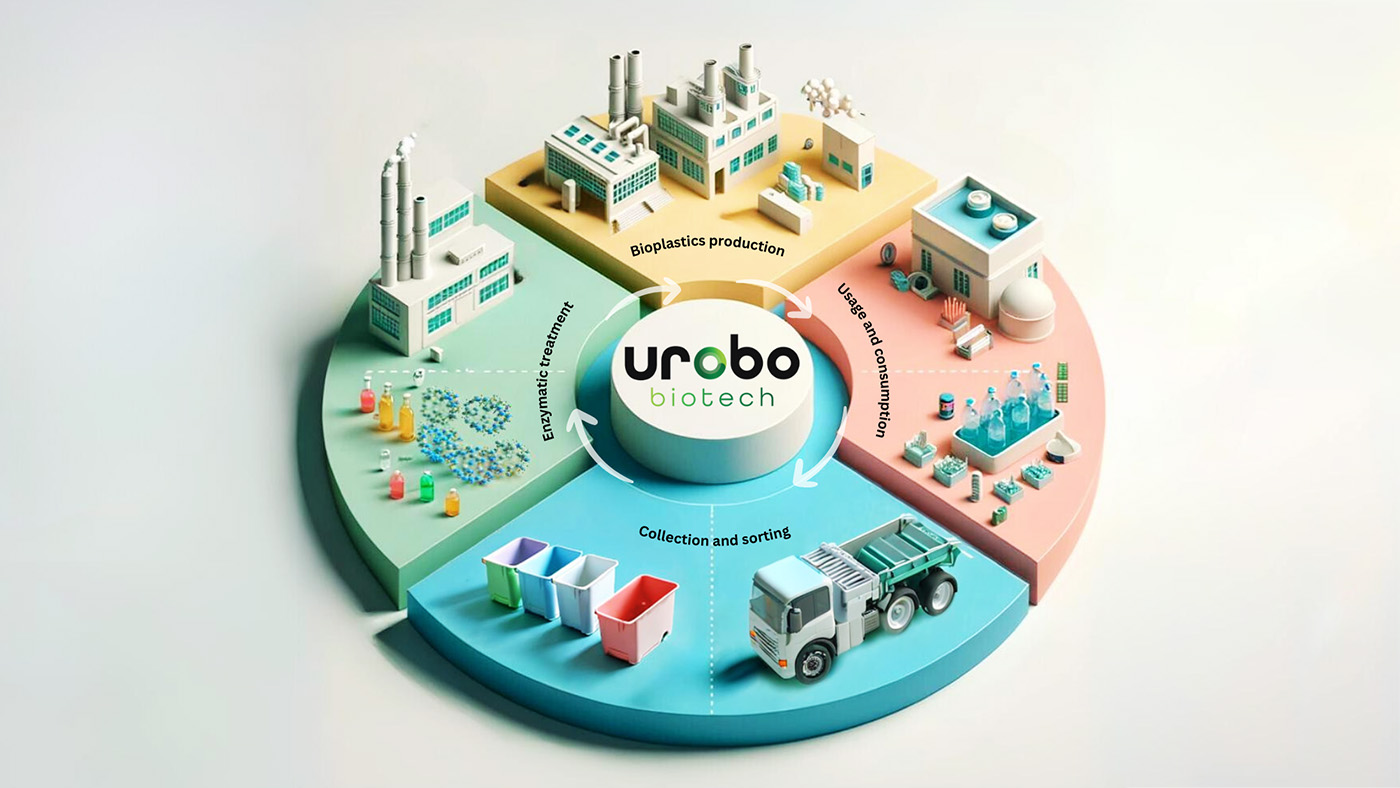
Urobo Biotech uses enzymes and microbes to convert bioplastic waste into high-value fuels and chemicals.

Stellenbosch University currently hosts 50 research chairs, 20 of which form part of the South African Research Chairs Initiative (SARChI), funded by the Department of Science and Innovation (DSI), through the National Research Foundation (NRF).
Microbiologist Wessel Myburgh “grew up” as a scientist and entrepreneur during his time as a member of the Senior Chair of Energy Research (CoER): Biofuels and Other Alternative Clean Fuels.
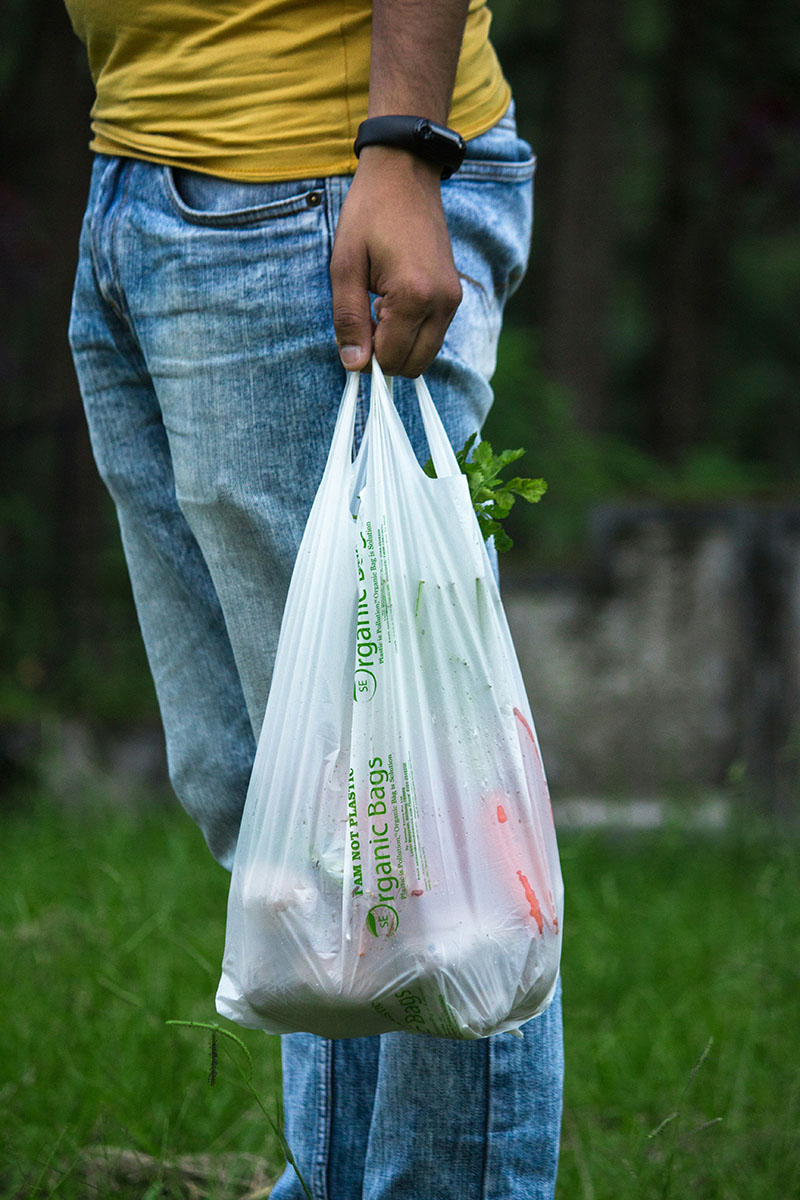
A sustainable packaging sector is critical to a circular economy. As such, Urobo Biotech is developing technologies that could benefit the end-of-life processing of bioplastic waste from packaging.
Now the co-founder of Urobo Biotech, Myburgh uses his knowledge of how yeasts and enzymes effectively break down plant-based waste into new products to improve the state of the planet he so dearly loves. He does this by tackling the mounting issue of what happens to used bioplastics.
Bioplastics include any plastic material that is either biobased, biodegradable or both. Some are made from plant materials only but others still have fossil resources as core ingredients, just like conventional plastics.
“If they are biodegradable, some materials containing fossil resources are still considered to be bioplastics,” Myburgh explains.
He warns that it is one-dimensional to assume that products made from bioplastics are necessarily better for the environment, as the projected increase in the use of such plastics over the next 25 years will come with its own set of problems.
“Such products are not a so-called ‘silver bullet’ solution to our plastic pollution problem. They too take years to decompose once discarded, and also release carbon dioxide into the atmosphere. The more we produce and use bioplastics, the more of it ends up in the environment.”
As stated on Urobo Biotech’s LinkedIn profile: “Bioplastics can be a more sustainable option than traditional plastics, but only when their waste is appropriately processed and recycled.”
“This time round, however, we have the benefit of learning from the mistakes made when conventional plastics were introduced,” explains Myburgh, who is known for his efforts to live sustainably.
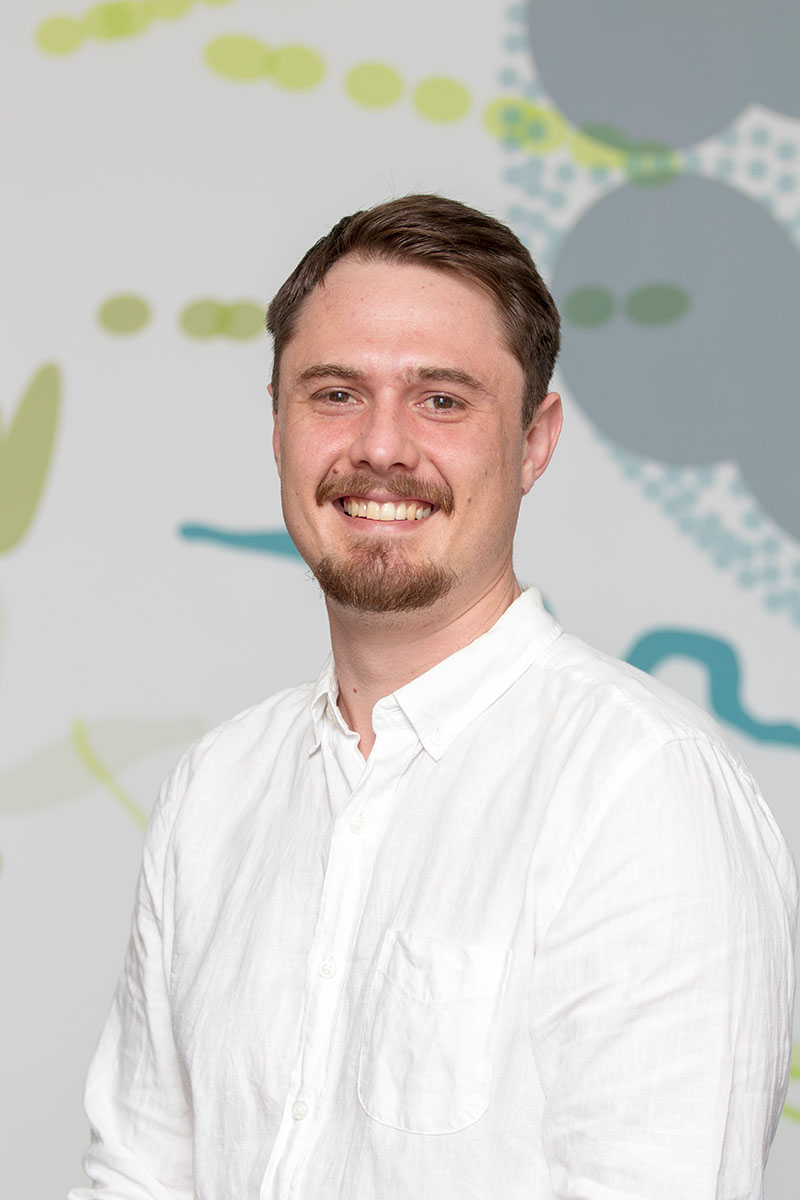
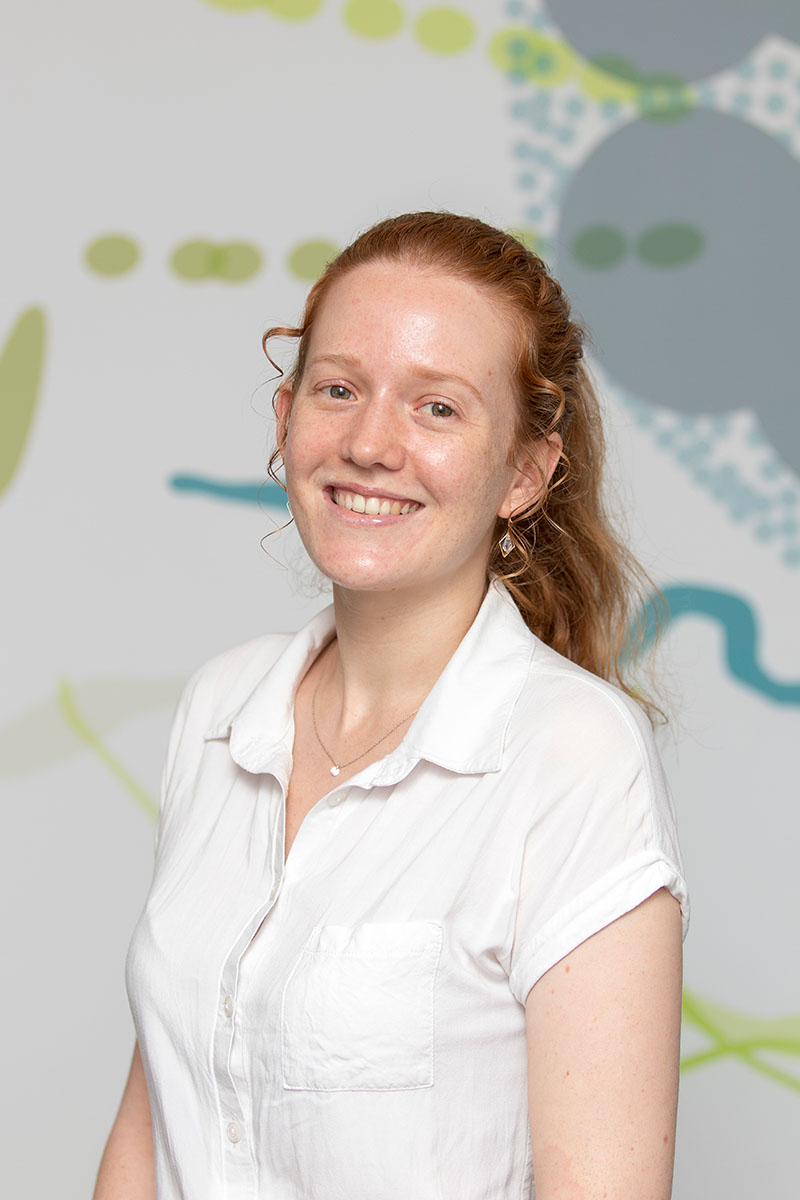
Wessel Myburgh (left) and Dominique Rocher, co-founders of Urobo Biotech
Breaking down the problem
Bioplastics are increasingly causing headaches for recycling companies that reprocess plastics into other products. The processes currently used in European anaerobic digestion facilities are not suited to handling bioplastics. Firstly, it causes blockages in the mechanics of such systems. Also, when bioplastic products are reprocessed along with conventional plastics, it unfortunately compromises the quality of the end products.
“Some companies, therefore, manually sort through collected materials or install new sorting equipment that uses near-infrared spectroscopy, but this is time-consuming and adds to their overheads,” says Myburgh.
As a possible solution, he has developed an add-on process that introduces specifically selected enzymes into existing recycling processes to tackle the breakdown of bioplastics in batches of mixed plastics, without the need for sorting. As a result, bioplastic waste is turned into high-value monomers such as lactic acid, succinic acid, and butanediol, all within twelve hours.
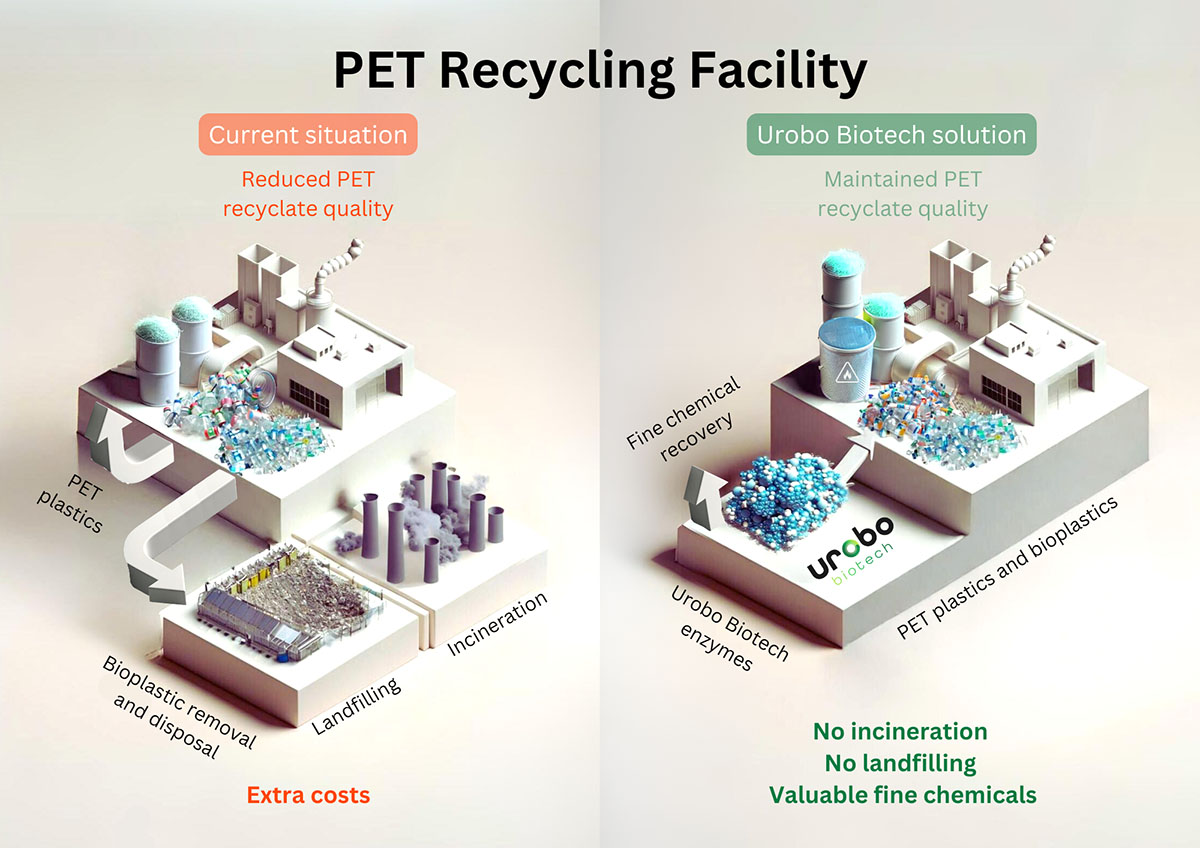
The added dimensions of biofuels research
Spin-out success
Because of the commercial potential of this process, Urobo Biotech was launched as a spin-out company in September 2023 with the help of SU’s technology transfer company Innovus. Urobo Biotech aims to help bioplastic production facilities improve the recycling of bioplastics, and also assist organic waste and conventional plastic recycling facilities that struggle with bioplastic contamination.
Over the past year, Myburgh has fine-tuned his scientific concepts with the help of Urobo Biotech co-founder Dominique Rocher, MSc student Hannah Foster, and the growing research groups at the University of Padova and SU.
The company has already made significant strides. It claimed first prize in the research-based category of the national Entrepreneurship Development in Higher Education competition in 2023. Station AI, a Japanese start-up incubation hub, has since taken the fledgling company under its wings, sharing valuable expertise.
Moreover, in February this year, Myburgh successfully pitched their business plans to the Academia Industry Training for Swiss and African science-based entrepreneurs for inclusion in their 10-day incubation programme in Switzerland later this year.
In 2023, Myburgh also represented Urobo Biotech at the COP28 climate conference in the United Arabian Emirates, per invitation of the annual Prototypes for Humanity programme. The latter showcases 100 of the most innovative projects globally that have real-world impact on the environment and society. The company was selected from over 3 000 applicants worldwide.

Did you know?
A single medium-sized organic waste facility spends approximately €800k annually to remove and dispose of bioplastic waste that inadvertently enters their systems. Extrapolating across Europe, the industry spends close to €240m per year on this aspect. Italy alone hosts 40 organic waste facilities. Urobo Biotech’s new technology offers a significant opportunity for such facilities to reduce costs, increase revenue, and tap into the huge projected global bioplastics market by 2030.
New ideas based on solid foundations
Myburgh is a veld and ocean lover with enough patience to grow bonsai trees. In his focus on bioplastics, he combines two of his passions: science and the environment.
In 2019, when he read that Japanese researchers had discovered bacteria that grow on and assimilate plastic bottles, it sparked his own ideas around how to recycle bioplastics into high-value byproducts. In formulating his plans, he kept in mind that people are seldom stirred into action “just for the sake of saving the planet”, and generally need some economic incentive.
Myburgh acknowledges that the progress Urobo Biotech has made in a seemingly short time was possible purely because of the Chair’s two decades of work serving as valuable building blocks for his research.
He obtained his honours degree (2017) and master’s degree (2020), both cum laude, under the guidance of Prof Emile van Zyl and other core members of the Chair. Through his MSc research, he learnt how to manipulate the expression of the right type of enzyme to effectively break down low-value plant material such as broken rice to subsequently produce bioethanol.
The self-driven Myburgh pitched his bioplastics idea to Van Zyl and Prof Marinda Viljoen-Bloom in 2019. As his PhD supervisors, they are both immensely proud of his achievements. Myburgh is conducting his co-tutelage doctorate in microbiology through SU and the University of Padova in Italy. In doing so, he is benefitting from the expertise of the latter university’s Prof Lorenzo Favaro, a leading researcher in second-generation bioethanol production from lignocellulosic sources, as well as bioplastics production from organic waste streams.
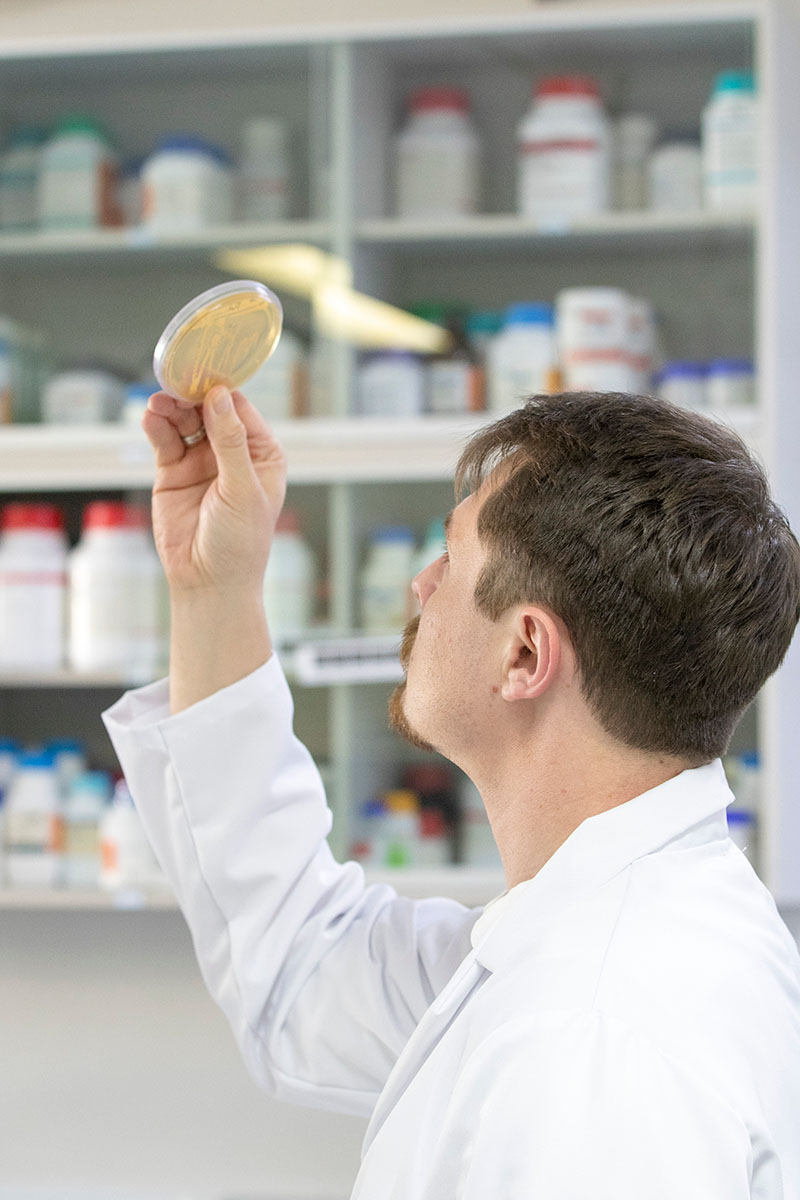
Working together
In 2023, Myburgh was the lead author of papers published in Bioresource Technology and Advances in Applied Microbiology, written in conjunction with his supervisors. These papers show how engineered strains of Saccharomyces cerevisiae (brewer’s or baker’s yeast) with enhanced genetic features can effectively break down and convert polylactic acid (PLA) bioplastics into high-end lactic acid.
“It’s great to have developed a real-world application based on our research. We are not the first or the only ones working on the problem of recycling bioplastics. However, thanks to our background and connection with the University of Padova — which has strong ties to industry — we’ve already made things happen,” Myburgh says.
The SU Department of Microbiology has been working with Favaro since 2008. The relationship has resulted in several publications and, in 2011, a patent on a process for engineering yeast strains to hydrolyse raw starch and ferment the resulting sugars into ethanol for biofuel production.
Urobo Biotech’s co-founder, Rocher, is also a product of biofuel research in SU’s Department of Microbiology. She investigated the enzymatic conversion of seaweed waste into biofuels for her MSc degree between 2020 and 2022. She simultaneously completed a second master’s degree, this time in environmental sciences. Later, she proceeded to earn a certificate in sustainable sciences, technology, and policy law from the University of Tsukuba in Japan.
She is now pursuing a PhD in microbiology as a co-tutelage student of SU and the University of Padova. Her aim is to further develop an enzyme cocktail to break down bioplastics more efficiently during anaerobic digestion in industrial settings.
Rocher says her involvement in Urobo Biotech is “driven by a belief in the necessity of tackling the plastic pollution crisis on a worldwide scale”. She is a beneficiary of the ARQUS Talent Scholarship Fund, which is managed by the ARQUS European University Alliance.

The research initiatives reported on above are geared towards addressing the United Nations’ Sustainable Development Goals numbers 1, 3, 6, and 7, and goals number 1, 6, and 7 of the African Union’s Agenda 2063.
Key facts about plastic pollution
More than 40% of all plastic is used only once before being discarded.
Plastic pollution is a global problem. Every year, 19–23 million tonnes of plastic waste leak into aquatic ecosystems, polluting lakes, rivers, and seas.
Approximately 9,2 billion tonnes of plastic have been produced since 1950, resulting in 6,9 billion tonnes of primary plastic waste.
Over 75% of plastic waste ends up in landfills, dumps, or the natural environment, including the oceans.
Plastic pollution can alter habitats and natural processes, thereby reducing ecosystems’ ability to adapt to climate change. This directly affects millions of people’s livelihoods, food production capabilities, and social well-being.
More than 5 trillion pieces of plastic are floating in our oceans.
Estimates of how long plastic endures range from 450 years to forever.
Source: UNEP and National Geographic
How enzymes aid recycling
Some say that enzymes are like the vitamin pill or the cup of coffee that people drink first thing in the morning to kick-start their day. That’s because enzymes are proteins that, as biocatalysts, speed up or enhance chemical reactions and processes happening within and to living organisms. Some enzymes improve the digestive system of humans and animals, while others are used to modify antibiotics or added to chemicals for purposes such as making washing powder stronger.
German physiologist Wilhelm Kühne coined the word “enzyme”in 1878 to describe the ability of yeast to produce alcohol from sugars. It is derived from the Greek words en (“within”) and zume (“yeast”). Their intrinsic properties make enzymes “ideal candidates” for the recycling sector as more environmentally friendly options to use to break down or hydrolyse different types of plastics at once, Myburgh explains.
Enzymes can function at mild temperatures (which saves costs) and neutral pH levels. They also require quite simple optimisation to improve their breakdown of plastics into relatively pure monomers.
Another advantage of enzymes is that some of them are very particular in their reaction to explicit polymers. If added to a mixed waste stream, such enzymes will target and start to convert only one specific type of polymer. As such, it is possible to add sets of different enzymes to mixed waste streams in a stepwise process to sequentially hydrolyse and break down different polymers to produce different kinds of relatively pure monomers or chemicals in liquid format.
“This negates prior sorting of a mixed waste stream and delivers a value-add in the form of chemicals,” Myburgh explains.
The resultant pure monomers can be sold as fine chemicals or turned into virgin polymers without reducing their quality or application grade. This means it is possible to recycle food-grade packaging back into food-grade resin.
The fact that enzyme-based polymer recycling systems can produce pure, higher-value monomers from mixed waste sources gives them a competitive advantage over current recycling systems, says Myburgh.
In sum, enzymes enable recycling facilities to use a truly circular recycling process that does not compromise polymer quality, to profit from diversified revenue streams, and to grow their client base.